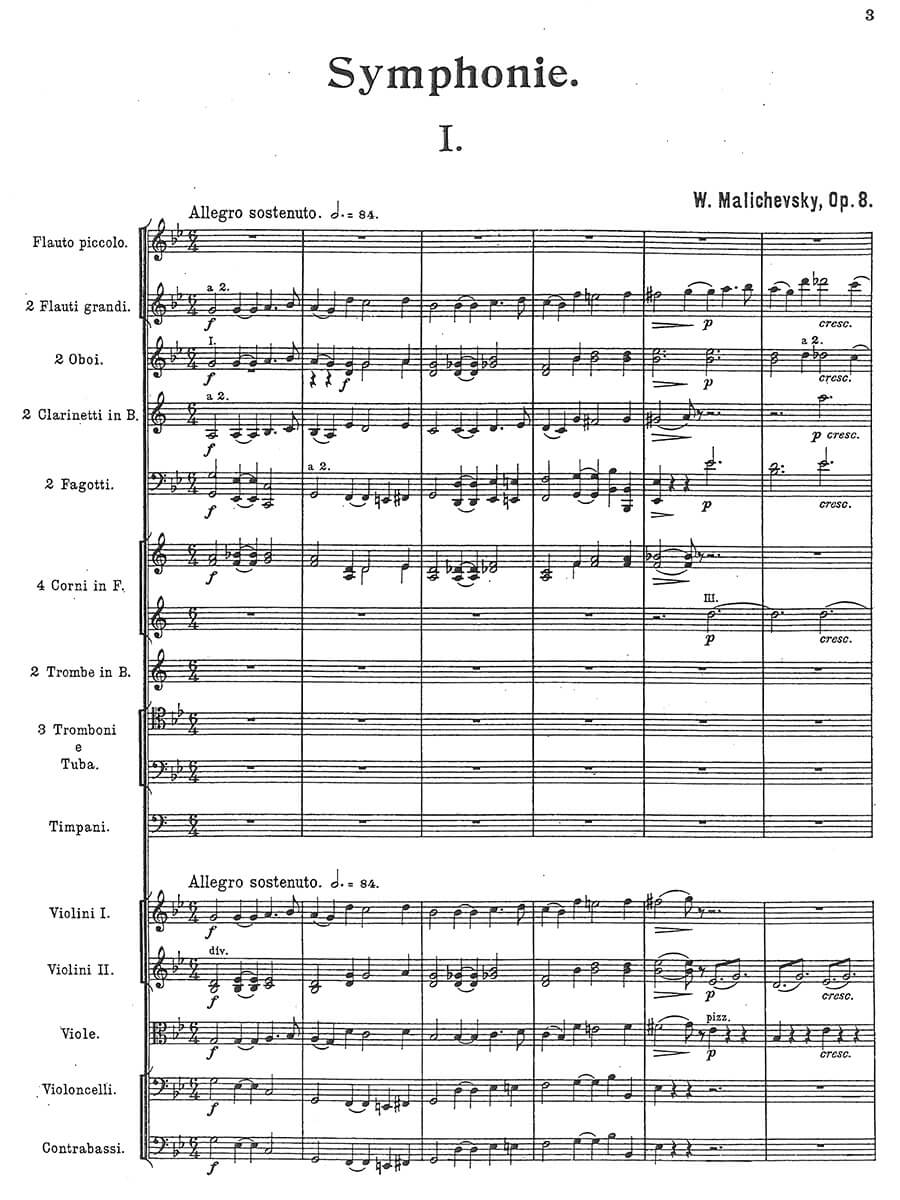Symphony No. 1, Op. 8 in G minor
Maliszewski, Witold
32,00 €
Preface
Witold Maliszewski
(b. Mohyliv-Podilskyi, Ukraine, 20 July 1873 – d. Zalesie, Poland, near Warsaw, 18 July 1939)
Symphony No. 1, Op. 8 in G minor
Allegro sostenuto p.3
Andante p.39
Scherzo. Allegro giocoso—Trio—Tempo I p.59
Thème Populaire. Allegro grazioso—Presto p.91
Preface
According to the Ukrainian pedagogue Mykola Ohrenych, “we have all grounds to regard Maliszewski as the founder of the Odesa composing school.” Yet Witold Maliszewski’s contributions reached far beyond the city limits of Odesa. Like many of Eastern Europe’s creative minds, the composer traversed national boundaries, both geographically and stylistically, for the duration of his career. Maliszewski’s oeuvre includes four symphonies, works for the stage (including ballet and opera), concertos, chamber music, pieces for solo piano, and choral religious works, and ranges in style from an early period of Russian neo-Romanticism to later works heavily marked by Polish folk music. Maliszewski also studied and worked in musical centers that, while they were part of Imperial Russia in his youth, are now located in Georgia and Ukraine and have always been marked by unique ethnic identities.
Maliszewski was born in Mohyliv-Podilskyi, Ukraine, on the border with Moldova. As a teenager, the composer studied with Mikhail Ipolitov-Ivanov at the school of the Imperial Music Society in Tbilisi, Georgia, before going to St. Petersburg for his secondary education. After studying mathematics at the university between 1891 and 1892, and medicine at the Military Medical Academy from 1893 to 1897, he enrolled in the music conservatory in St. Petersburg as a piano and composition student. Maliszewski’s teachers included Nikolai Rimsky-Korsakov, a member of the Russian school of composition known as the “Mighty Handful,” and Alexander Glazunov, for whom he wrote his Ouverture Joyeuse in 1910. His education in St. Petersburg stood him in good stead and his early compositions were well-received. In 1902, he received a prize at the Prince K. Lubomirski Composition Competition for his Ten Pieces for Piano. He also received three composition awards from the Petersburg Chamber Music Society, one each year between 1903 and 1905.
In 1908, Maliszewski moved from the Russian cultural center to its Ukrainian counterpart in Odesa where, from 1908 to 1911, he served as the conductor of the Odesa Music Society’s symphony orchestra. In 1913, he helped to found the Odesa Conservatory and served as its first rector. He was a talented performer and professor of composition, harmony and counterpoint in addition to his administrative duties and during his tenure in Odesa, he published writings on composition and music theory, including his Teachings on Modulations (Uchenie o moduliatsiakh) in 1915. As the school’s rector, he was responsible for bringing famous pedagogues and musicians from all over Europe to Odesa, making the conservatory the fourth most prestigious musical institution in the Russian Imperial lands (following St. Petersburg, Moscow, and Saratov) and an immediate center of musical learning whose level of tutelage was commensurate with similar institutions throughout Europe. The composer was also a musical activist. At the 1917 convention for music directors in what was now called Petrograd, he gave a compelling speech on the future of Eastern European music adumbrating a list of considerations and challenges he thought important for those in his field. The conservatory’s “Epoch of Maliszewski” was particularly marked by a broad performance repertoire, with the introduction of works that had not yet been heard in Odesa’s concert halls. Unfortunately this element of the school’s culture all but disappeared when Maliszewski stepped down as rector. …
Read full preface > HERE
Score Data
| Edition | Repertoire Explorer |
|---|---|
| Genre | Orchestra |
| Size | 210 x 297 mm |
| Printing | Reprint |
| Pages | 132 |
